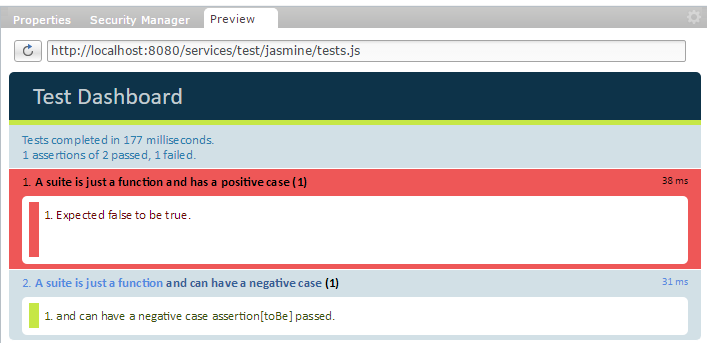Testing Server-Side JavaScript with Jasmine
Jasmine is a popular test framework that supports BDD (Behavior-Driven Development) with testing JavaScript code. It does not require DOM. And all that makes it a very good candidate for a test framework of choice for JavaScript Scripting Services in Dirigible. It is made available for you to use as a Dirigible GitHub project.
Testing Server-Side JavaScript with Jasmine
Writing tests with Jasmine is fun. It has interesting style of naming its functions so they sound quite natural. You literally describe what your code (it) is expect ed to do with nice fluent assertion API. Here's (a dumb simple) example of how it looks:
$$j.describe("A suite is just a function", function() {
$$j.it("and has a positive case", function() {
$$j.expect(false).toBe(true);
});
$$j.it("and can have a negative case", function() {
$$j.expect(false).not.toBe(true);
});
});
It's pretty much a functional specification of your code. Hence, how it supports BDD. There's plenty of examples out there how to make use of it for client-side apps so I won't spend time on that right now. The point of this blog is to show how to make use of it for testing server side code in Dirigible.
Jasmine API in Dirigible Scripting Environment
Once you get the Jasmine project from GitHub into your workspace, you need to require the library first before you can make anything with it. Open up a file in the Test Cases section of your project (or create it manually if you don't have one yet) and start writing: var j = require("jasmine/jasmine");. The j variable is a reference to the Jasmine API and now you are completely into the Jasmine world. Set it up and use require to reference the code you want to test and start asserting its behavior using the Jasmine API as you normally would when testing client-side JavaScript libraries.
var j = require("jasmine/jasmine");
var jasmine = j.core(j);
var env = jasmine.getEnv();
var $$j = j.interface(jasmine, env);
Test runner
So, you have your tests developed and now you are eager to run the suite. There are a couple of options here. You can go quite native to Jasmine and take care of integrating a test results reporter (we provide two reporters adapted for Dirigible for you out-of-the-box, one for console and one as a JSON service). Or even better, and I shall focus on this now, you can use the Jasmine Test Runner Service (require with path jasmine/jasmine_test_runner_svc). It is designed to work with the core Test Runner module in Dirigible to deliver test results as a service in a form suitable for you user agent. If you requested the test suite file via a browser (or the Preview view in Dirigible IDE) it will redirect the results to the Test Dashboard HTML UI. And if you requested it e.g. with cUrl using Accept: application/json header it will deliver test results formatted as JSON as a response. This makes it suitable both for direct consumption or integration in third-party quality control systems and it will cost just a single line of code to enable.
require("jasmine/jasmine_test_runner_svc").service(env);

And when requested for JSON instead of HTML it will deliver the following payload:
{
"tests": [
{
"id": "spec0",
"name": "and has a positive case",
"module": "A suite is just a function ",
"runtime": 36,
"assertions": [
{
"message": "Expected false to be true.",
"result": false
}
],
"failed": true,
"total": 1
},
{
"id": "spec1",
"name": "and can have a negative case",
"module": "A suite is just a function ",
"runtime": 26,
"assertions": [
{
"message": "and can have a negative case assertion[toBe] passed.",
"result": true
}
],
"failed": false,
"total": 1
}
],
"testSuite": {
"runtime": 122,
"total": 2,
"passed": 1,
"failed": 1
}
}
Putting it all together
Finally, putting it all together, here is the layout of Jasmine-Dirigible test suite with two test cases delivering results as a service, that we discussed so far.
var j = require("jasmine/jasmine");
var jasmine = j.core(j);
var env = jasmine.getEnv();
var $$j = j.interface(jasmine, env);
$$j.describe("A suite is just a function", function() {
$$j.it("and has a positive case", function() {
$$j.expect(false).toBe(true);
});
$$j.it("and can have a negative case", function() {
$$j.expect(false).not.toBe(true);
});
});
require("jasmine/jasmine_test_runner_svc").service(env);
Now, you are all set to benefit from what Jasmine has to offer to you as a developer for JavaScript server-side code.